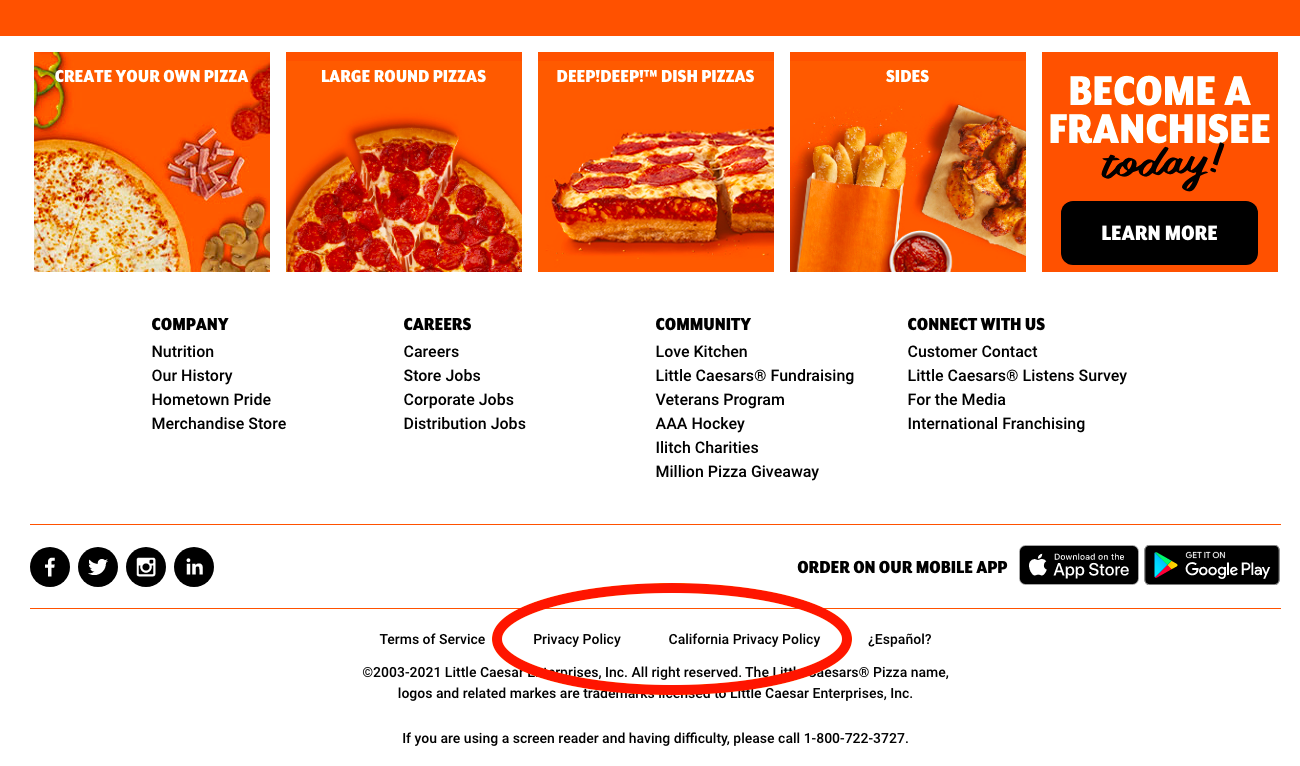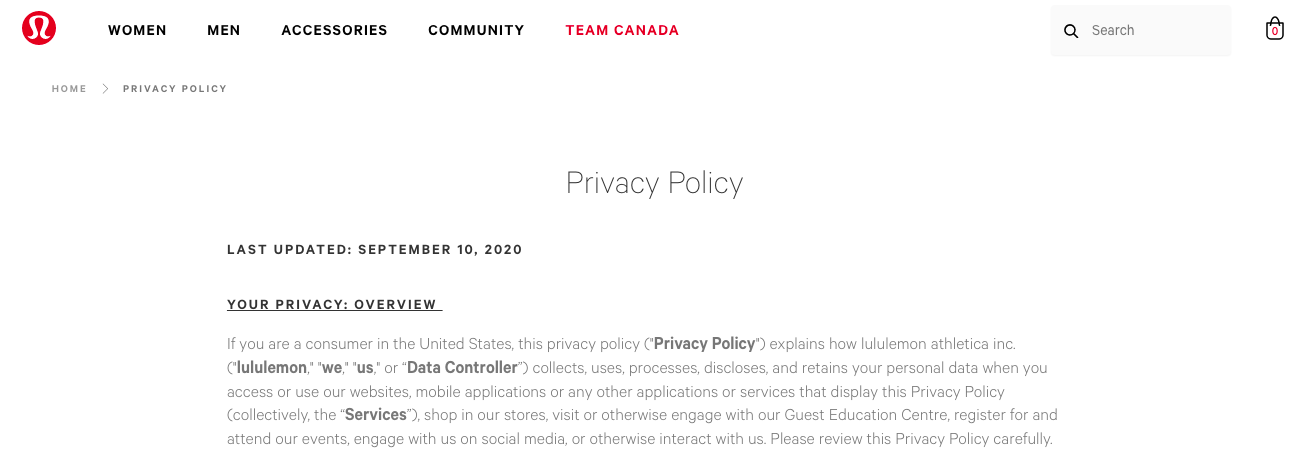How People Buy Online: Websites vs. Apps
Retailers are making digital a priority in 2018. And for good reason: Forrester is predicting that digital will in some way impact more than half of...
4 min read
Written by Katie Iannace, Oct 26, 2021

This article will dive into what an app privacy policy is, why you need one, what should be included, and the easiest way to get one for your website or app.
A privacy policy is a legal statement on an app or website clearly outlining what aspects of a user’s data are collected, how it is stored, and what is done with that information.
Imagine what the world would look like if we did not have clear guidelines around what people did with your personal information. It would be akin to walking into a grocery store to pick up dinner and while there, employees are writing down everything about you. They’d record your home address, interests, search history, purchase history, and credit card number. When you leave the store, you have no idea what they’ll do with all that data nor how long they’ll save it.
Online activity used to occur like this when sharing information was like the wild west. Thankfully, we’re in a more sophisticated age, though it does require more advanced policies around privacy and data sharing.

Only every detail surrounding what is done with users’ data. Easy, right? But remember, this is a legal document. It’s important all i’s are dotted and t’s crossed. Should a business fail to list that some aspect of data is being stored and users discover this, then the business is open to a fraud lawsuit. These points outlined in the privacy policy can cover everything from IP and email address to social security numbers and bank accounts.
It’s equally as important to clarify exactly why this data is being used. For example, perhaps storing location coordinates is relevant for showing you what restaurants in your area provide takeout Pad Thai. If an app records a device’s location, then the privacy policy needs to state why. What can’t be done is collecting this information and not stating in the policy how it is being used.
What is important to note here is the collection and use of data by any third parties connected to your business, app, and website must also be mentioned. Even if you’re not using the data, if a third party in connection to your website or app is, then it has to be listed in your privacy policy as well.
You can use what’s listed below as a general overview of what you need in a privacy policy:
If you’ve come far enough where you’re needing a privacy policy for an app you’re developing, chances are you’ve had exposure in your life to other versions of one. For example, have you ever used Uber, browsed Reddit, paid someone with Venmo, or ordered a delicious $5 Hot-and-Ready from Little Caesars? If so, there is a privacy policy outlining how your information is being stored and used on those sites.

Now that data storing and information tracking are common digital practices, it’s important businesses are upfront about how a user’s personal information is managed. Providing clarity around this topic both protects the business from accusations for data mishandling, as well as lets the user make informed decisions about which websites and apps they trust. Mark Zuckerberg’s testimony at a 2018 Senate hearing is an illustrative example of the consequences of privacy policies not accurately reflecting a business’ data practices.
In most circumstances, it’s required to have a privacy policy stated on your app, web app, and website. For example, if you want to host your app in the Apple app store or Android app stores, then you have to include a clear privacy policy defining how users’ data is used. If you don’t, you can have your app suspended, rejected, or removed from their platforms.
Similarly, there are laws protecting individuals’ right to privacy concerning their personal information, which extends to online activities.
A few notable privacy laws domestic to the USA are CalOOPA and CCPA. Without getting bogged down in the legal-ese of these laws, the overarching takeaways concern:
These laws were designed to protect the rights of consumers who also are residents of California. However, even if you don’t live in California, your business isn’t based there, nor are you even targeting Californians, if there is the chance that a California resident might stumble across your app or website, then you need to make sure your privacy policy is in accordance with these laws.
Though there isn’t one overarching federal law concerning online privacy, there is an alphabet soup of laws (like the GLBA and FTCA) that cover niche regulations that must be followed.
Finally, if you are working on a global website or app with users outside the U.S., then it’s important to note the European Union has a General Data Protection Regular (GDPR). This law is stricter than any of ours in the U.S. and is actively enforced, stressing the need to maintain stringent user data protection and privacy.

Are you feeling overwhelmed yet? Don’t worry, as a law degree certainly isn’t necessary to obtain an encompassing privacy policy.
There are a handful of sites out there where you can generate a privacy policy for your app. Free options are fairly basic, but if you’re running a simple site, like a blog that only collects emails, then it should do the trick. For modest one-time fees, there are more customizable options suitable for more robust websites and apps.
These policy generators are great for most app and web developers and remove the need for a legal background. The forms will ask you some easy to know questions about your business model, app, or website. After plugging in your answers, you’ll be emailed a complete privacy policy that you can copy over to your website. Of course, if you’re having another company build your app, then that team will likely have a privacy policy template that will customize to your business and drop into your app.
When it comes to understanding privacy policies for apps and websites, think of it like a tax return. It’s important to know what it is and why we do it. But we don’t need to know how to do it ourselves. It’s best left to the professionals. Instead, put those extra hours towards furthering your app/website and creating an awesome product.
Interested in learning about other essential elements that go into an app or web app? Get in touch!
You might also like:
Subscribe to our newsletter.

Retailers are making digital a priority in 2018. And for good reason: Forrester is predicting that digital will in some way impact more than half of...

Should you create a cross-platform app or a native app (built specifically for either the iOS or Android platform)? Differing opinions abound. Some...

Building an enterprise app is a great way tocreate a custom solution to your business’s challenges. If you’re considering creating an app for your...
Post
Share